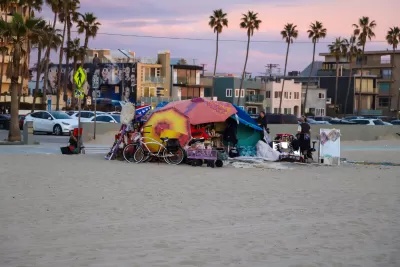A new study finds that low-income seniors are increasingly unable to find affordable housing.

The “largest and most comprehensive investigation of California’s homeless population in decades” found that close to half of unhoused people in California are over 50, putting them at unique risks as they navigate living on the street or in shelters. Anita Chabria highlights the study’s findings in the Los Angeles Times.
The study, conducted by the University of California, San Francisco’s Benioff Homelessness and Housing Initiative, reveals that “As Californians age, they are being priced out of housing.” According to the study, “the results held regardless of whether a person was without housing in one of our large cities, or in our less-populated northern and eastern counties.”
The implications of the study indicate that many seniors fall into homelessness after a critical life event, and affordable housing is often not available. “For every 100 extremely low-income people in California, defined as making less than 30% of area median income, there are only 24 units of affordable housing available.”
Dr. Margot Kushel, lead investigator on the study “said her findings should be a wake-up call that while access to substance use treatment and rebuilding the mental health care system are urgent for some of the homeless population, the only solution to homelessness is housing.” Moreover, “we have to do better at keeping people in the housing they have, through rent subsidies and other direct intervention, when life punches them in the face.”
FULL STORY: Nearly half of homeless people in California are over 50, study finds

Planetizen Federal Action Tracker
A weekly monitor of how Trump’s orders and actions are impacting planners and planning in America.

Chicago’s Ghost Rails
Just beneath the surface of the modern city lie the remnants of its expansive early 20th-century streetcar system.

San Antonio and Austin are Fusing Into one Massive Megaregion
The region spanning the two central Texas cities is growing fast, posing challenges for local infrastructure and water supplies.

Since Zion's Shuttles Went Electric “The Smog is Gone”
Visitors to Zion National Park can enjoy the canyon via the nation’s first fully electric park shuttle system.

Trump Distributing DOT Safety Funds at 1/10 Rate of Biden
Funds for Safe Streets and other transportation safety and equity programs are being held up by administrative reviews and conflicts with the Trump administration’s priorities.

German Cities Subsidize Taxis for Women Amid Wave of Violence
Free or low-cost taxi rides can help women navigate cities more safely, but critics say the programs don't address the root causes of violence against women.
Urban Design for Planners 1: Software Tools
This six-course series explores essential urban design concepts using open source software and equips planners with the tools they need to participate fully in the urban design process.
Planning for Universal Design
Learn the tools for implementing Universal Design in planning regulations.
planning NEXT
Appalachian Highlands Housing Partners
Mpact (founded as Rail~Volution)
City of Camden Redevelopment Agency
City of Astoria
City of Portland
City of Laramie





























